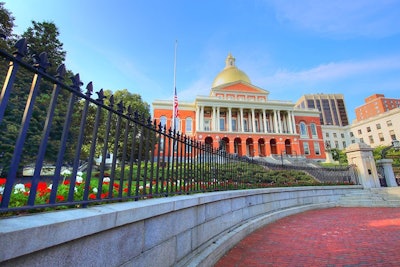
In an effort to crack down on local corruption, U.S. Attorney Andrew Lelling has convened a federal grand jury to investigate municipal cannabis contracts—called “host community agreements”—in Massachusetts.
Great Barrington, Eastham, Leicester, Newton, Northamptom and Uxbridge have received subpoenas from Lelling’s office inquiring about the cities’ host community agreements with the cannabis businesses operating within their borders, according to The Boston Globe.
Under state law, each adult-use cannabis company must sign a host community agreement with the municipality in which it hopes to operate prior to applying for a state license, the news outlet reported. The contracts typically require the cannabis business to pay the municipality, a system that has long been criticized as one that could attract local corruption.
And these fears have not been unfounded. Falls River Mayor Jasiel Correia II was arrested in September and charged with extorting hundreds of thousands of dollars in cash and campaign contributions out of local cannabis business owners by accepting bribes in exchange for license approval. Correia has pleaded not guilty, The Boston Globe reported.
Massachusetts law limits the value of payments under host community agreements to 3 percent of the company’s annual revenue for a maximum of five years, according to the news outlet, and mandates that any payments be “reasonably related” to the costs the community might rack up by hosting a cannabis businesses. But many communities have sought additional funds through separate fees or mandatory donations to local nonprofits in exchange for license approval, The Boston Globe reported.
Lelling’s subpoenas request myriad documentation from the targeted municipalities, according to the news outlet, such as copies of host community agreements, communications between cannabis companies and local officials, communications among local officials regarding the contracts, records demonstrating community support or opposition to local cannabis businesses, records regarding municipal employees or officials attempting to win local cannabis licenses or work for cannabis companies, and records about public meetings or votes on cannabis business license applications.
Massachusetts Cannabis Control Commissioner Shaleen Title welcomes the investigation into the host community agreements, according to a WBUR report.
“I receive complaints almost every day that the process is out of control,” Title told the news outlet. “Just yesterday, I received a complaint from a business that a town told the company representatives that only businesses who offered a ‘donation’ of $15,000 would be considered. When they suggested they would rather not voluntarily donate, they say they were told ‘perhaps this isn’t the right town for you.’”
Commission members have long expressed frustration that Massachusetts’ cannabis law is vague regarding the regulation of host community agreements, WBUR reported, and cannabis business owners asked the courts at the beginning of the year to grant the Cannabis Control Commission the authority to more strictly regulate the contracts.
Massachusetts Grower Advisory Council President Peter Bernard told MassLive.com at the time that the large fees required by many host community agreements are “a barrier to entry to the smaller operator.” The Massachusetts Grower Advisory Council reviewed 77 host community agreements and found that the majority of them require cannabis businesses to pay fees well above 3 percent of the companies’ annual revenues, as mandated by state law.
“These documents reveal systemic abuses of power by municipalities in their negotiations with marijuana establishments,” the organization and its attorneys wrote in their petition to the courts.

























